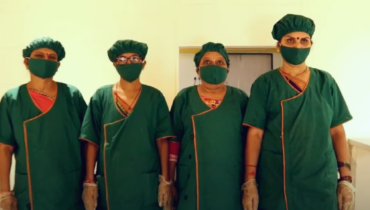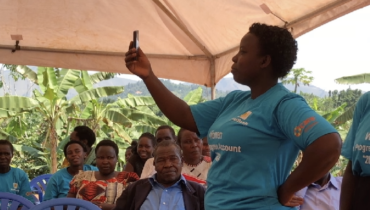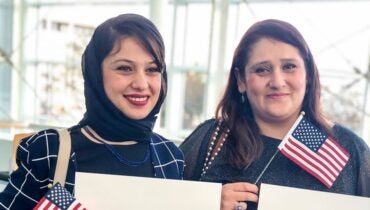Creases at her smile-points coursing down her face in chasms, skin leathery with the sun, the woman before me holds my gaze steadily as we chat, sitting cross-legged on the packed earth floor of a neighbor’s home in an alpine village in the lower Himalayas of Uttarakhand, Northern India. I met Tulsi Devi this past summer when I was working as an educator running global education and immersion programs for American high school students in India. She was the leader of her village’s Self Help Group (SHG), and the village representative for a district-wide women’s animal husbandry and cottage industry cooperative. Yet 15 years ago, Tulsi never spoke with men outside of her immediate family, and she knew very few women besides her mother-in-law. Though she tended the fields while her husband worked construction in far-away Delhi, her in-laws controlled all cash flow in his absence. After her husband’s death, Tulsi’s family financially abandoned her, and soon after, cattle raiders ransacked her field and stole her only dairy goat, leaving her and her children to forage pickings from neighbors’ fields for the next two years. Today, Tulsi describes her life as a vine of many chapters, tendrils spinning off in different directions. Yet, over our conversation, she would often circle back to one particular moment—her first opportunity to gain access to finance. To Tulsi, this marked a turning point, which ultimately altered her position in society and enabled her to become a person characterized by action and empowerment instead of as a victim.
Nearly a year after the cattle-raider attack, word came of an SHG-based financial saving and loaning program for women starting in a nearby village, and Tulsi’s neighbors spoke of starting a similar group. Tulsi was skeptical and refused to join. But a year later, a member from a different SHG visited her village and encouraged her and several other women to participate. This time, Tulsi accepted the offer.
Access to a loan from the collective’s pooled funds granted Tulsi sufficient financial security to reallocate several hours of each day from farm work to salaried day labor at a nearby public works construction project, for the first time granting her access to a regular cash salary in her own name. After repaying her initial loans, Tulsi used the new income to repair her fences to keep bandits and wild boars from destroying her crops. With the help of additional SHG loans, she eventually purchased goats and a milk-cow, thus investing in income-generating infrastructure and accumulation of capital. Today, Tulsi has her own bank account, signs her own name on official documents, and independently financed her daughter’s wedding.
In addition to increasing her financial security and independence, Tulsi’s association with the SHG also pulled her out of her previous social isolation and connected her to women with similar life experiences and livelihoods. She learned that other women experienced increasingly dry, infertile soil and dust-devils that would rise up with the wind and pull up entire hillsides with their whirlwind funnels. She saw that she was not the only one who was having to walk longer and longer distances to reach running water each year, often as far as 10 miles in a single direction.
Learning that the negative impact from environmental degradation was collective and not just her own experience, Tulsi became very involved with the Save the Valley[1] movement—an advocacy and programming network that included self-help groups, a local non-profit, and elected representatives to village-level government. While these new, more public and inter-gendered interactions were a major break from her past, the fact that Tulsi earned her own income deflected family pushback against her increasingly visible presence in the community.
Tulsi has since become a major advocate for reforestation to preserve the valley’s eco-system and conserve and replenish its water sources. Today, she leads a reforestation nursery and replanting monitoring project across three villages through a local NGO working with the valley conservation coalition. Her leading concerns are ensuring that both men and women from her community participate in the valley-wide campaign for better government services to protect against the environmental degradation and climate change threatening the river basin, and, consequently, their collective livelihoods.
For Tulsi, gaining access to finance has had a multiplier effect, awakening in her a drive to advocate for the long-term interests of her entire community. Tulsi’s segue from personal empowerment into community leadership illustrates a crucial aspect to peace and security that is increasingly recognized, but often still difficult to replicate in practice – economic participation. A context-specific tipping point seems to be the key.
We know that women are uniquely and disproportionately affected by armed conflict, climate change and natural disasters. We also know that women’s pre-existing responsibilities to family and culture mean they have a powerful hold over community psyche and have an incredible capacity to galvanize their peers towards social change. Tulsi Devi exemplifies how advancing women’s roles in the economic space, be it rural or urban, can be that powerful catalyst. Economic participation does not only help women—it transforms the ability of entire communities to advocate for their own concerns in ways that have long-lasting and widespread impact.
[1] Roughly translated from the Hindi, not official nomenclature.


